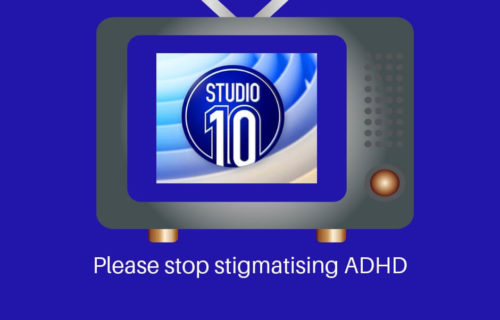
An Open Letter to Steve Biddulph: Please Help Reduce ADHD Misinformation & Stigmatisation
Dear Steve
I’d like to introduce myself. My name is Lou Brown. I am a 50-year-old Australian woman with ADHD. I also have a 10-year-old son who has ADHD.
As a member of the ADHD community, a group that often feels marginalised and misunderstood, I am writing to express my concerns about the way you have addressed ADHD in your new book Raising Boys in the 21 Century. I am very disappointed to discover that a person of your standing, a ‘parenting expert’, could write such superficial and inaccurate information about such a debilitating disorder in such a judgmental and stigmatising manner.
Whilst most experts draw on the current meta-analysis data available on ADHD when discussing the disorder, you base your comments on one individual’s views. You also pose many rhetorical questions that imply your standpoint and lead the reader to your intended conclusion.
For this reason, I would like to take this opportunity to provide you with some evidence based-information that may assist you in discussing and writing about ADHD in a more informed manner in the future.
Let’s start here. You wrote:
“ADHD is the name given to a syndrome or cluster of behaviours … This cluster usually includes distractibility, forgetfulness, poor impulse control and hyperactivity – moving around all the time. It’s not hard to spot.”
“ADHD is over diagnosed”
What we know is that ADHD is a complex neurobiological disorder which affects an individual’s ability to regulate their thoughts, words, actions and emotions, and to sense and perceive time. There are 3 subtypes of ADHD noted in DSM-5 (American Psychiatric Association, 2013). They are:
- Predominantly hyperactive/impulsive-type.
- Predominantly inattentive-type.
- Combined-presentation.
Whilst the behaviours you mention are associated with having the combined inattentive and hyperactive type of ADHD, not all kids with ADHD are hyperactive and therefore ADHD isn’t always easy to spot. In fact, the Australian data shows the majority of kids in Australia with ADHD fit the inattentive criteria. These kids are at greater risk of going undiagnosed and therefore often do not receive the treatment and support they require to negotiate life successfully.
Here are the stats from the 2015 Australian Child and Adolescent Survey of Mental Health and Wellbeing that provide further information about the prevalence of ADHD in Australia. During the study:
- 4% of children and adolescents in Australia were found to have an ADHD diagnosis – the equivalent to an estimated 298,000 children and adolescents. [A meta-analysis of 175 research studies worldwide on ADHD prevalence in children aged 18 and under found an overall pooled estimate of 7.2% (Thomas et al. 2015). Hence ADHD is Australia is not over diagnosed in children as the prevalence statistics in Australia align closely with worldwide prevalence data.]
- Of the three sub-types of ADHD, inattentive type was the most common, with 3.4% of children and adolescents having inattentive type, 1.2% hyperactive type and 2.8% combined type.
“…what we label ADHD …”
ADHD is not a label. It is a diagnosis that is made after a comprehensive medical, developmental and mental health review, of which the findings must meet the Diagnostic and Statistical Manual of Mental Disorders ADHD criteria. Kids with ADHD who go undiagnosed or don’t receive the treatment and support they require however, well they often get labelled i.e. the naughty child, the trouble maker, the class clown.
“Approximately 5 percent of boys in the US and somewhat less in various other countries, are given the diagnosis and treated with fairly significant amphetamine medication.”
Calling stimulant medication ‘amphetamine medication’ immediately conjures up concerns about drug addiction. However, concerns that stimulant medication may increase the risk of later substance abuse have been refuted by more than 14 studies (Barkley, Fischer, Smallish, & Fletcher, 2003). Instead, the research suggests well managed treatment with stimulant medication may significantly reduce substance abuse risk in individuals with ADHD (Chang et al., 2014). For example, in their 2016 study, McCabe et al. (2016) found that when stimulant medication treatment is started early (before age 9) and continued for more than 6 years, it may cut the rate of substance abuse in half. In fact, research suggested that early treatment with stimulant medication reduced the risk of substance abuse in youth with ADHD to the level of risk associated with youth without ADHD.
“That such a disorder might occur – without explanation and without any known mechanism or physical cause – that requires one in twenty of the male population to take strong medication to control, has shocked and concerned many commentators and practitioners.”
Whilst at present there is no conclusive evidence to support any single aetiological factor causes ADHD, quantitative genetic studies (including family, twin and adoption studies) suggest ADHD is strongly genetic in origin. According to Barkley (2016):
- If a parent has an ADHD diagnosis, then their children are 6-8 times more likely to have the disorder (35-54%).
- If a child has ADHD their biological siblings are 3-5 times more likely to have ADHD (25-35%), their mother is 3-4 times more likely to have ADHD, and their father is 5-6 times more likely to have ADHD.
- If one identical twin has ADHD, the other twin is 75-90% more likely to also have ADHD.
The symptoms of ADHD are associated with deficits in executive control (or self-control) arising from the lag in neurodevelopment, as well as differences in neural structure, connectivity, and function. Research indicates individuals with ADHD typically develop executive control more slowly than their neurotypical peers (30-40% or 2-3 years behind their peers). Additionally, two thirds of individuals with ADHD only develop 70-80% of the executive function capacity of neurotypical individuals.
“…significant amphetamine medication..” “… strong medication to control…”
Stimulant medication is the most commonly prescribed and most effective class of medication used to treat the symptoms of ADHD. Whilst stimulant medication does not cure ADHD, studies have consistently shown it improves an individual with ADHD’s ability to function (Barkley, 2015; DeVito et al, 2008) as it:
- Successfully reduces ADHD symptoms, including hyperactivity, impulsivity and distractibility.
- May improve short term memory, learning performance, emotional regulation, social skills and peer relations.
- Can lead to an increase in self-esteem.
Stimulant medication is one of the most comprehensively researched medications on the market. The dose prescribed is very low and despite concerns about its safety, studies show that taking stimulant medications to treat ADHD does not:
- Adversely affect the development of the brain’s cerebral cortex (Barkley, 2015). Instead there is exciting evidence emerging that indicates stimulant medication may have a protective effect on a child’s brain. There are over 32 studies that show brain development in children with ADHD who take stimulant medication over the long term, is more in line with that of their neurotypical peers. In other words, stimulant medication appears to promote brain development (Barkley, 2015a).
- Produce the euphoric effects associated with drug abuse in individuals with ADHD or increase the risk of substance abuse as discussed above.
Specialists do not recommend stimulant medication be relied upon as the only form of ADHD treatment. Instead, the data indicates that taking a multimodal approach to ADHD treatment is important for the following reasons (Chronis et al., 2006; Pelham 1999; Pelham et al., 1998, cited in Barkley, 2015):
- Stimulant medication does not provide 24 hours a day coverage.
- Medication alone does not teach children and adolescents with ADHD the skills they need to function more competently. Whilst behaviour treatment alone is ineffective when children and adolescents are unable to focus in order to absorb information and learn from interventions or instructions.
- Children and adolescents with ADHD experience problems across multiple domains and these problems may respond differently to treatments. For example, stimulant medication has been shown to reduce ADHD symptoms, whilst psychosocial interventions appear to have more impact on family relationships and academic functioning.
- Normalisation is rare with any singular treatment but there is some indication that combined treatments increase the chance of normalisation.
“…certain inherited tendencies towards having ADHD, but these require stress or attachment difficulties in pregnancy, infancy or childhood to release their disturbing effects.”
These are the comments that most upset parents of kids with ADHD. There is no credible evidence to indicate parenting style or social environment alone can lead to a child developing ADHD (Barkley, 2015). Instead, as stated above, ADHD has been shown to result primarily from a complex interplay of genetics and neurology. Whilst adverse social environments (i.e. stress, social adversity, parental/institutional insensitivity or deprivation, physical maltreatment) may increase the likelihood of ADHD gene activation, as well as the degree of ADHD gene expression, these conditions do not need to be present for a child to develop ADHD.
In conclusion, I feel it is important to highlight that the research into the risks associated with not effectively treating ADHD are of much more concern than the medication used to treat the disorder. Poorly managed ADHD symptoms can greatly affect a child with ADHD’s ability to self-reflect, develop self-awareness and accurate self-perception; to communicate effectively; to think socially; to interact with others, be accepted by others and form bonded relationships; to participate fully in extracurricular activities; and, to develop independence. Their symptoms can also negatively impact upon parent-child and child-sibling relationships, and upon family function.
As a result, a child with ADHD’s self-esteem and quality of life can suffer, for when children with ADHD are:
- Unable to meet the expectations placed upon them and therefore experience failure over and over again (even when they are trying their hardest).
- Constantly on the receiving end of correction, redirection, criticism (and possibly social rejection and isolation).
they are more likely to feel frustrated, embarrassed, humiliated, demoralised and discouraged, as well as ashamed, inadequate, unworthy and regretful. They may also come to believe over time that they are fundamentally different, flawed or broken, and begin to anticipate or predict future failure (Barkley, 2015). Additionally, poorly treated ADHD in childhood contributes to the reason why adults with ADHD are at high risk of developing anxiety and depression, alcohol and substance abuse issues, and eating disorders. They are also at higher risk of criminality, self-harm and suicide, with the suicide risk of individuals with ADHD being approximately 1.8 times higher than the general population (Barbaresi et al., 2013).
Unfortunately stigma around the disorder increases the chance of kids with ADHD having poor outcomes as it has been shown to:
- Influence whether a parent decides to have their child assessed for ADHD or not.
- Lead to parents underestimating the risks involved with having poorly treated ADHD.
- Muddy the truth around best practice evidence-based ADHD treatment options.
- Interfere with parents being able to make informed and educated decisions around how to best support their child with ADHD.
- Affect treatment adherence and treatment efficiency.
and therefore needs to stop being perpetuated.
I hope this information has helped to widen your view of the daily challenges and realities experienced by young people with ADHD and their families. I sincerely hope that, moving forward, you are able to support us in our quest to reduce misinformation and stigmatisation around the disorder. For all kids with ADHD deserve to receive the treatment and support they require in order to develop their strengths and capacities to their full potential, successfully navigate the multiple challenges of busy modern life, and – not just survive – but thrive!
Thank you for your assistance in this matter.
Kind regards
Lou Brown

Post Update 15th September 2018: Steve Biddulph has written to me in person. He has decided to remove the section on ADHD from ‘Raising Boys’ straight away and will post a corrective message on his website in the next few weeks. He now understands how important it is to support kids with the ADHD and their parents. I cannot thank you all enough for your support in obtaining such a great outcome. Lots of love, Lou x
Post references are available here




Well written Lou 😁👍
Thank you x
Omg ! What a well written and articulated article …
I sincerely hope he reads this and can look within himself to be brave enough to stop perpetuating stigma and myths surrounding this disorder.
Thank you. I hope so too x
Thank you for putting into words what I have tried to express.
You’re so welcome. I hope it makes a difference x
Perfect!!! Well crafted, measured, informed and accesssable. Great piece of writing!
Thank you x
I want to thank you for this well written and referenced article, after seeing Steve Biddulph’s article I was deeply saddened by his misinformed comments, hopefully he will read your open letter and think again.
Annemarie
You’re welcome. I hope so too x
Thank you so much for writing this. An excellent resource! What a shame that this has happened from a man many admire and look up to as the “expert”.
You’re welcome. And yes it is very disappointing. x
Thank you so much for writing this wonderful, eloquent and well-researched reply to Steve Biddulph. I can’t believe that he has published this stigmatising and offensive rubbish. I hope he’ll read your letter and rethink his opinion. It would be nice to have an apology for all the hurt he is causing.
You’re so welcome. I would like to see that happen as well. I’d also like to see his book removed for sale until the misinformation is rectified.
Wow, so well done! Thank you for your advocacy and for articulating so beautifully all those facts. We need more like you! xx
You’re so welcome x
Thank you for standing up for all the children (& adults) who have ADHD. It was beautifully written – so clear and concise.
You’re so welcome. x
Worded respectfully despite the insensitivity, and frank ignorance of Mr Biddulph. Its great you have taken time to provide him with such important information.
Pls do let us know if you get any response.
Thank you Ed. Unfortunately I still haven’t received a response from him. I will let you know when I do x
Hi Lou I went to a conference yesterday about managing children’s behaviour with ADHD and the presenter Fintan O’Regan mentioned Steve in regard to boys Ed. and I cringed. Your response letter is so well written and supported by evidence which his comments are sweeping misinformed garbage. I will somehow email your response to Fin when I get a chance with your permission.
Hi Samantha. Thank you. And please do share the post with Fintan. The more people that standup to the inaccurate info out there the better. x
I have shared this on my face book page and to the various groups I belong to. It is so well written. Thank you. It is so clear and concise. We live everything you have written about with my son. Age 9.
You’re welcome Tania. Thank you for supporting me by sharing this post with others x
Amazing letter and wonderful outcome. Thank you Lou.
My nine year old son has just been diagnosed so I’m reading and learning a lot – this letter and Steve’s appropriate response are both heartening for me.
You’re welcome Liz. I really admire Steve for how he has responded to this letter. All the best to you and your son x
Lou, what a pleasure to read your response and the outcome. Very well said.
Thank you Scott.
Lou, you have brought hope to my heart with your well articulated and incredibly eloquent article. I am so inspired by your ability to address these issues in such a level-headed and professional manner. I am overjoyed by your success in achieving such a positive outcome for the ADHD community. Thank you!
Lou, you have brought hope to my heart with your well articulated and incredibly eloquent article. I am so inspired by your ability to address these issues in such a level-headed and professional manner. I am overjoyed by your success in achieving such a positive outcome for the ADHD community. Thank you!
Wow, fantastic outcome. Thank you!